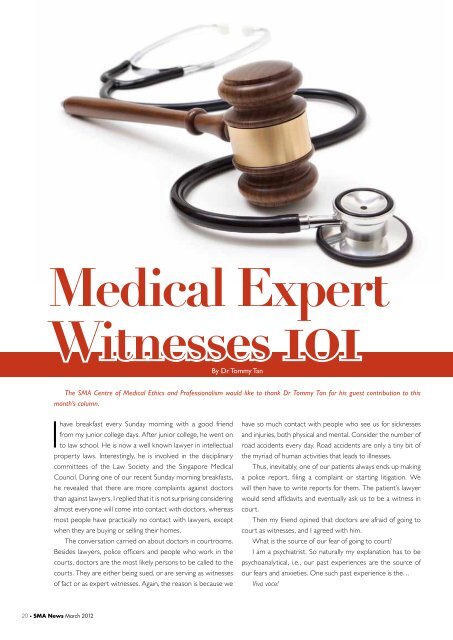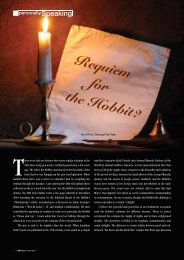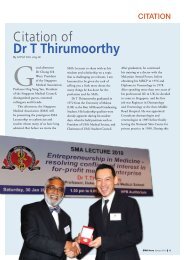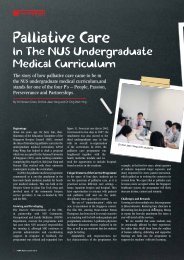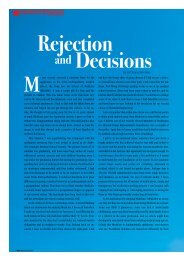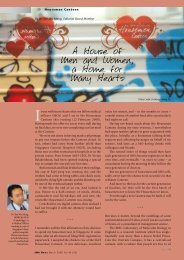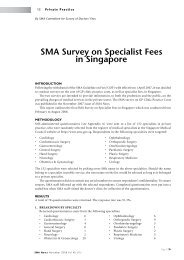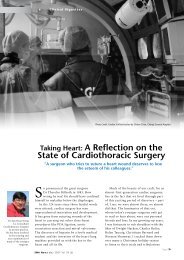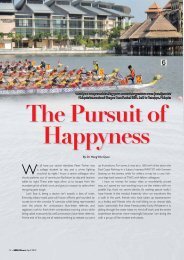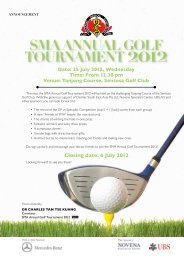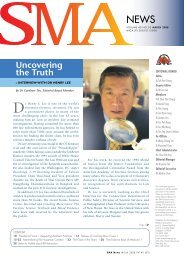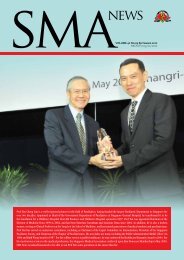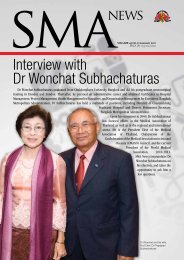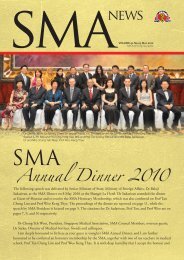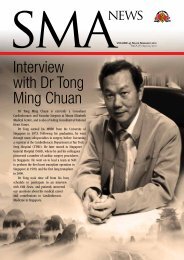I have breakfast every Sunday morning with a good friend from my ...
I have breakfast every Sunday morning with a good friend from my ...
I have breakfast every Sunday morning with a good friend from my ...
Create successful ePaper yourself
Turn your PDF publications into a flip-book with our unique Google optimized e-Paper software.
Medical Expert Expert<br />
Witnesses 101<br />
The SMA Centre of Medical Ethics and Professionalism would like to thank Dr Tom<strong>my</strong> Tan for his guest contribution to this<br />
month’s column.<br />
I<br />
<strong>have</strong> <strong>breakfast</strong> <strong>every</strong> <strong>Sunday</strong> <strong>morning</strong> <strong>with</strong> a <strong>good</strong> <strong>friend</strong><br />
<strong>from</strong> <strong>my</strong> junior college days. After junior college, he went on<br />
to law school. He is now a well known lawyer in intellectual<br />
property laws. Interestingly, he is involved in the disciplinary<br />
committees of the Law Society and the Singapore Medical<br />
Council. During one of our recent <strong>Sunday</strong> <strong>morning</strong> <strong>breakfast</strong>s,<br />
he revealed that there are more complaints against doctors<br />
than against lawyers. I replied that it is not surprising considering<br />
almost <strong>every</strong>one will come into contact <strong>with</strong> doctors, whereas<br />
most people <strong>have</strong> practically no contact <strong>with</strong> lawyers, except<br />
when they are buying or selling their homes.<br />
The conversation carried on about doctors in courtrooms.<br />
Besides lawyers, police officers and people who work in the<br />
courts, doctors are the most likely persons to be called to the<br />
courts. They are either being sued, or are serving as witnesses<br />
of fact or as expert witnesses. Again, the reason is because we<br />
20 • SMA News March 2012<br />
By Dr Tom<strong>my</strong> Tan<br />
<strong>have</strong> so much contact <strong>with</strong> people who see us for sicknesses<br />
and injuries, both physical and mental. Consider the number of<br />
road accidents <strong>every</strong> day. Road accidents are only a tiny bit of<br />
the <strong>my</strong>riad of human activities that leads to illnesses.<br />
Thus, inevitably, one of our patients always ends up making<br />
a police report, filing a complaint or starting litigation. We<br />
will then <strong>have</strong> to write reports for them. The patient’s lawyer<br />
would send affidavits and eventually ask us to be a witness in<br />
court.<br />
Then <strong>my</strong> <strong>friend</strong> opined that doctors are afraid of going to<br />
court as witnesses, and I agreed <strong>with</strong> him.<br />
What is the source of our fear of going to court?<br />
I am a psychiatrist. So naturally <strong>my</strong> explanation has to be<br />
psychoanalytical, i.e., our past experiences are the source of<br />
our fears and anxieties. One such past experience is the…<br />
Viva voce!
Even before enrolling in medical school in Singapore, I,<br />
like all potential medical students had to sit before a panel of<br />
three senior doctors, to assess <strong>my</strong> suitability to be a doctor.<br />
I left the interview, anxious for days, wondering if I was <strong>good</strong><br />
enough to be a doctor.<br />
Then came the gruelling examinations we had to take in<br />
medical school. Written examinations boded little anxiety<br />
for us, as we <strong>have</strong> gotten used to such examinations since the<br />
PSLE. However, the viva voce was not something we ever<br />
had experienced in our earlier schooldays.<br />
With the exception of a few subjects for which the<br />
viva voce was compulsory, viva voce was reserved for the<br />
fortunate few who were distinction candidates and the<br />
unfortunate few who were considered “borderline” passes.<br />
I will always remember our collective sigh of relief when we<br />
discovered the viva voce had not befallen us for another year.<br />
For the fortunate or unfortunate few selected, the anxiety<br />
persisted for a little while more.<br />
For these few compulsory viva voce, one or more<br />
pairs of eyes would be peering at you, trying to establish<br />
whether you were <strong>good</strong> enough for them. Doctor, are you<br />
sure what you are saying is correct? Have you considered<br />
the other differential diagnoses? Treatment? Prognosis?<br />
The permutations of anxiety-provoking questions were<br />
seemingly infinite. We would leave feeling distraught or<br />
happy depending on how we perceived our performance.<br />
For some of us, the torment continued in postgraduate<br />
Medicine. Viva voce was no longer restricted to the selected<br />
few, but was now compulsory for all candidates.<br />
Medical school inadvertently prepared us to be afraid<br />
of going to court. As doctors, we are quite comfortable<br />
writing medical reports. However, when we receive a call<br />
<strong>from</strong> a lawyer requesting us to be a witness in court, our<br />
dormant anxieties of viva voce are resurrected. “Oh no,”<br />
our unconscious tells us, “I am going to be questioned. Will<br />
I pass?” Of course, for some people, it would be, “Will I get<br />
<strong>my</strong> distinction?”<br />
The only preparation I had in medical school was when<br />
<strong>my</strong> <strong>good</strong> <strong>friend</strong> (who is now an ENT surgeon) and I snuck<br />
into the Subordinate Courts one afternoon, after lessons<br />
in our first year (at what is now the College of Medicine<br />
Building), and sat through part of what I remember as a<br />
coroner’s hearing.<br />
Subsequently, I only learnt how to cope <strong>with</strong> the anxieties<br />
of being in court through repeated exposures. Exposure<br />
therapy is <strong>good</strong> treatment for phobias.<br />
I am still anxious when I go to court nowadays, although<br />
perhaps less so than <strong>my</strong> first time, which was when I appeared<br />
in the High Court before Justice TS Sinnathuray. I was very<br />
relieved that I did not need to take the stand that day. So there<br />
was no need for <strong>my</strong> unconscious to judge <strong>my</strong> performance.<br />
Occasionally, a medical colleague will ask me how to<br />
prepare to go to court. I usually give the following advice to<br />
relieve the resurrected anxieties.<br />
First and foremost, you are not on trial (unless you are the<br />
defendant). You are only asked for the facts or for your opinion.<br />
You will not be punished or acquitted after the hearing.<br />
You know more than the judge and the lawyers about<br />
the subject. This is unlike medical school viva voce when our<br />
examiners would usually know more than us.<br />
Read your notes to refresh your memory.<br />
Have a <strong>good</strong> <strong>breakfast</strong> if the hearing is in the <strong>morning</strong>. It<br />
may be a long wait. Meanwhile, <strong>have</strong> a moderate lunch if you<br />
are due for the afternoon; you do not want to feel drowsy.<br />
Remember to bring all your notes. You may need to refer<br />
to them.<br />
Bring a <strong>good</strong> book, preferably something unrelated to the<br />
case. You probably <strong>have</strong> to wait for your turn on the stand, so<br />
you will need something to distract yourself.<br />
Bring a bottle of water. There is nowhere to drink if you<br />
are at the Subordinate Courts, unless your <strong>good</strong> lawyer<br />
<strong>friend</strong> invites you to its bar room (strangely no alcohol served<br />
despite its designation). There is a cafe on the ground floor of<br />
the High Court but it would be quite a hassle and somewhat<br />
uneconomical to patronise it just to quench your thirst.<br />
Always make yourself comfortable before you go to the<br />
stand, i.e., empty your bladder. You will not know how long<br />
you will be on the stand.<br />
Lastly and most importantly, be honest and frank about<br />
what you know. Do not go beyond your expertise. Do not<br />
speculate even if you are asked to. Stick to the facts.<br />
And you can ask the honourable judge for a break if you<br />
need to go to the bathroom.<br />
Dr Tom<strong>my</strong> Tan, MBBS (Singapore) 1987 (part of<br />
last batch to be at the College of Medicine Building<br />
before the medical faculty moved completely to Kent<br />
Ridge), MMed (Singapore) (Psychiatry) 1993, and<br />
Postgraduate Diploma in Forensic Psychiatry (London)<br />
1997 (HMDP). Dr Tan, a psychiatrist, has served as<br />
expert witness for Psychiatry in the local courts. He has<br />
been in private practice since 2007. He plays golf once<br />
a week and wants to play more.<br />
CMEP<br />
March 2012 SMA News • 21


